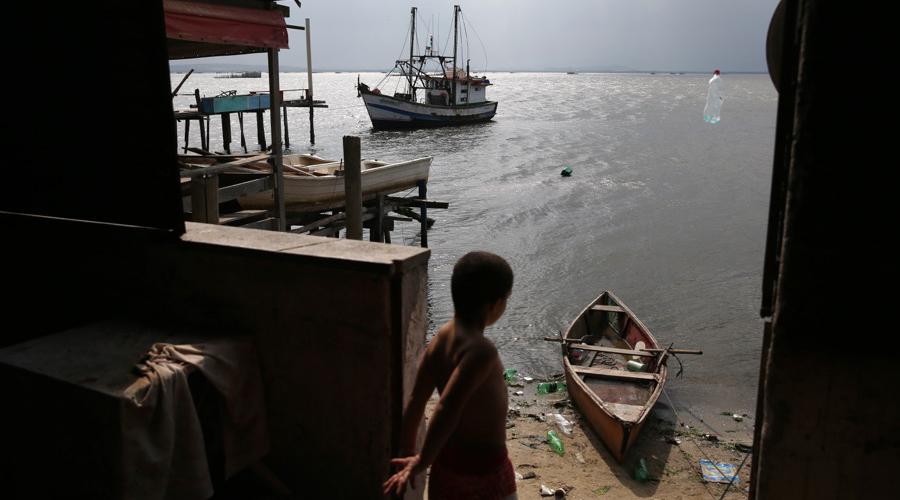Rio’s water cleanup barely works and it’s crimping impoverished fishermen
A boy throws a plastic bottle into Guanabara Bay in Rio de Janeiro on Aug. 7.
Black, fetid water laps against the edge of Rio de Janeiro’s Guanabara Bay. Greasy sand is so blanketed in trash and filth that it’s hard to tell where the beach ends and the water begins.
And it’s even harder to imagine that this was once an area of pristine beauty, what with the stink, the piles of plastic and the roar of traffic from the nearby freeway.
In the run-up to the 2016 Summer Olympics, Rio’s state government came under fire for the disgusting state of the bay on which Olympic sailors would compete. Athletes complained not only about water quality, but also about the large amounts of flotsam, from soda bottles, to whole couches, floating in the bay.
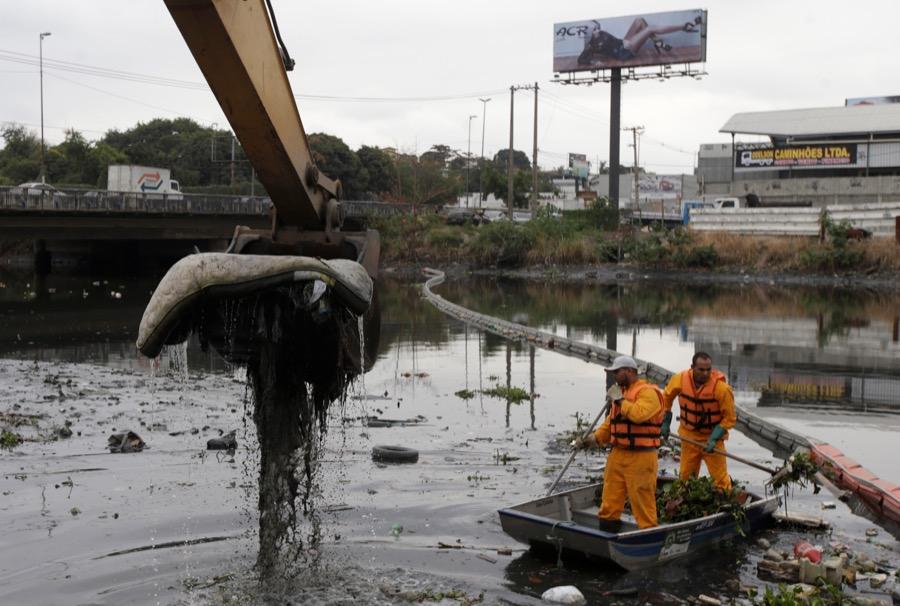
Rio’s response was to install 17 “eco-barriers,” which are buoys, some with nets, that are strung across streams and rivers to trap trash from floating into the bay. The authorities also sent a fleet of “eco-boats” so workers could skim the garbage out with nets.
Neither measure was considered much of a success. In the weeks before the Olympics, many of the eco-boats were beached because the state couldn’t afford to pay for them. An investigation by Rio’s O Globo newspaper concluded the efforts only collected about 7.5 percent of the trash flowing into the bay.
And it turns out the eco-barriers aren’t just ineffective. They’re also inconveniencing poor and disenfranchised fishing communities around the city. The barriers block key rivers that men and women traditionally use to reach their fishing areas on Guanabara Bay. This led to a game of cat-and-mouse: Fishermen in at least one community cut down the barriers with machetes, the government comes and fixes them, and people promptly cut them down again within a few hours. And so on.
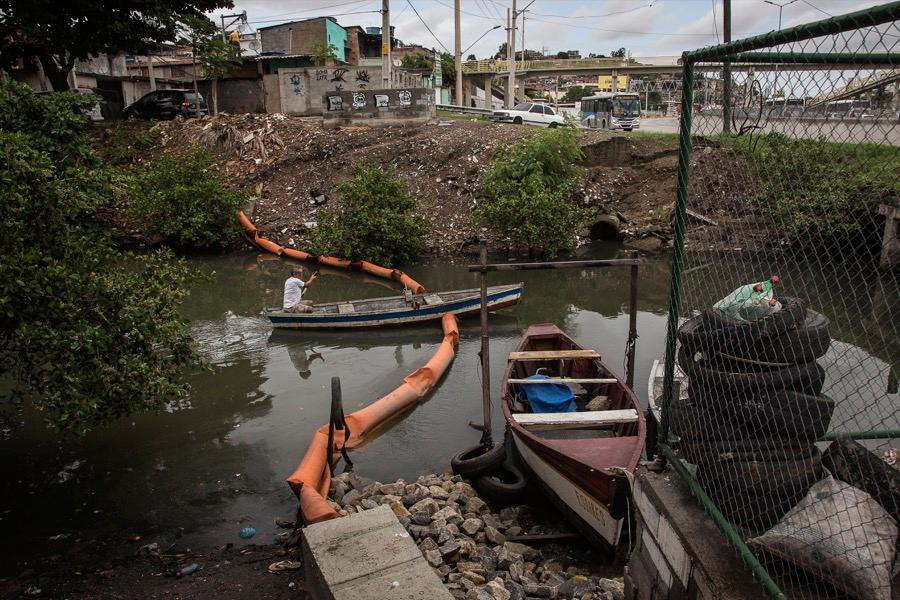
“The government sets up these barriers to clean up the trash and it just disturbs the life of the fishermen,” says Jananci Delmiro Junior, a fisherman from the São Gonçalo neighborhood on the eastern side of the bay who goes by “Juninho.” “Unfortunately, the fishermen have to go up to the barriers and cut them with knives, so they can pass in their boats. How else are they supposed to get past, if they live upstream?”
For folks like Juninho, access to the bay is a lifeline. They rely on the fish they catch for vital protein to feed themselves and their families. They sell whatever they have left at a local market, using the proceeds to buy essentials like rice and beans. Even when the fishing is good, this São Gonçalo community is desperately poor by Brazilian standards. Many homes don’t have running water or electricity, and in interviews more than a dozen fishermen described living from hand to mouth.
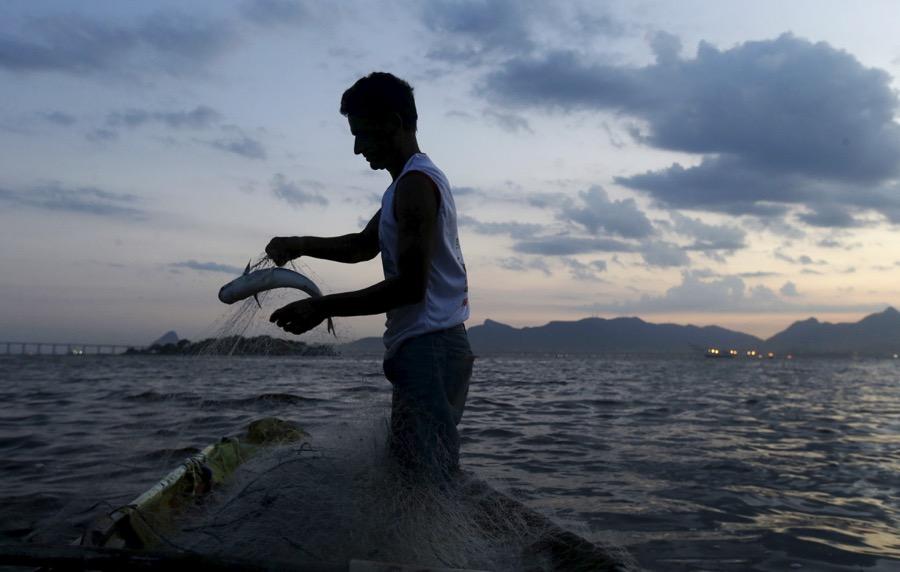
The Rio state environment ministry did not respond to numerous requests for an interview or to written questions.
Rodolfo Paranhos, a marine biologist at the Federal University of Rio de Janeiro who runs a program monitoring the state of the bay, said the eco-barriers were never expected to have much more than a cosmetic impact on the bay’s pollution.
“Look, it’s an interesting measure, to prevent this trash to reach the bay,” he said. “But there are more things behind this. There should be a lot of education of people, education of problems to prevent them to release trash.”
Juninho puts it another way.
“There are all these factories dumping chemicals into the bay,” he says. “And lots of sewage flowing in too. Fishing today is getting more and more precarious.”
In a recent half-day tour of the São Gonçalo neighborhood, an area of several square miles bordering the industrial city of Niterói across the bay from Rio, only one eco-barrier was still intact. Another barrier across the Vila Maruí canal had been cut clean in half. Another, across the Marimbondo River had been removed completely, presumably for repair, after fishermen cut it down.
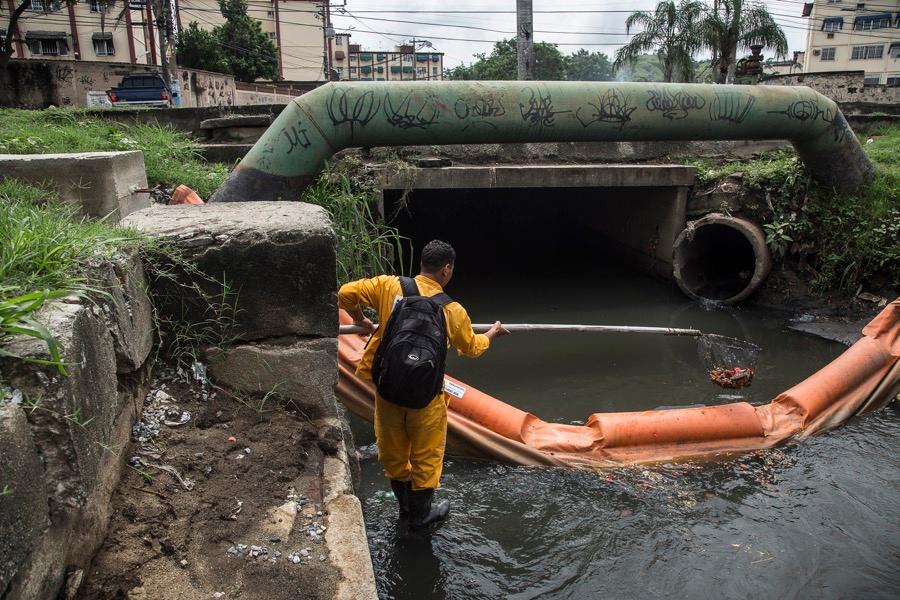
The only remaining eco-barrier evident was slung across a narrow, filthy stream, barely 10 feet across. Manning the barrier was Marcelo Rocha, an employee of the Rio state environment agency, known by its Portuguese initials INEA. Rocha said he is paid to scoop up barrier trash between 7 a.m. and 5 p.m. Monday to Friday.
As he spoke, debris steadily piled up behind the low wall of bright orange buoys strung across the stream behind him: an ice cream tub, a mangled plastic laundry basket, soda bottles, a plastic bag of household trash.
Rocha said his brother is tasked with manning the eco-barrier on the Marimbondo River, right by Juninho’s house. He agreed that the current vicious cycle of slashing and repairing the barriers isn’t helping anybody.
“It’s a war between the fishermen and the government,” he says. “The government needs to just come up with a solution that doesn’t inconvenience the fishermen and doesn’t inconvenience them. It’s pretty simple.”
